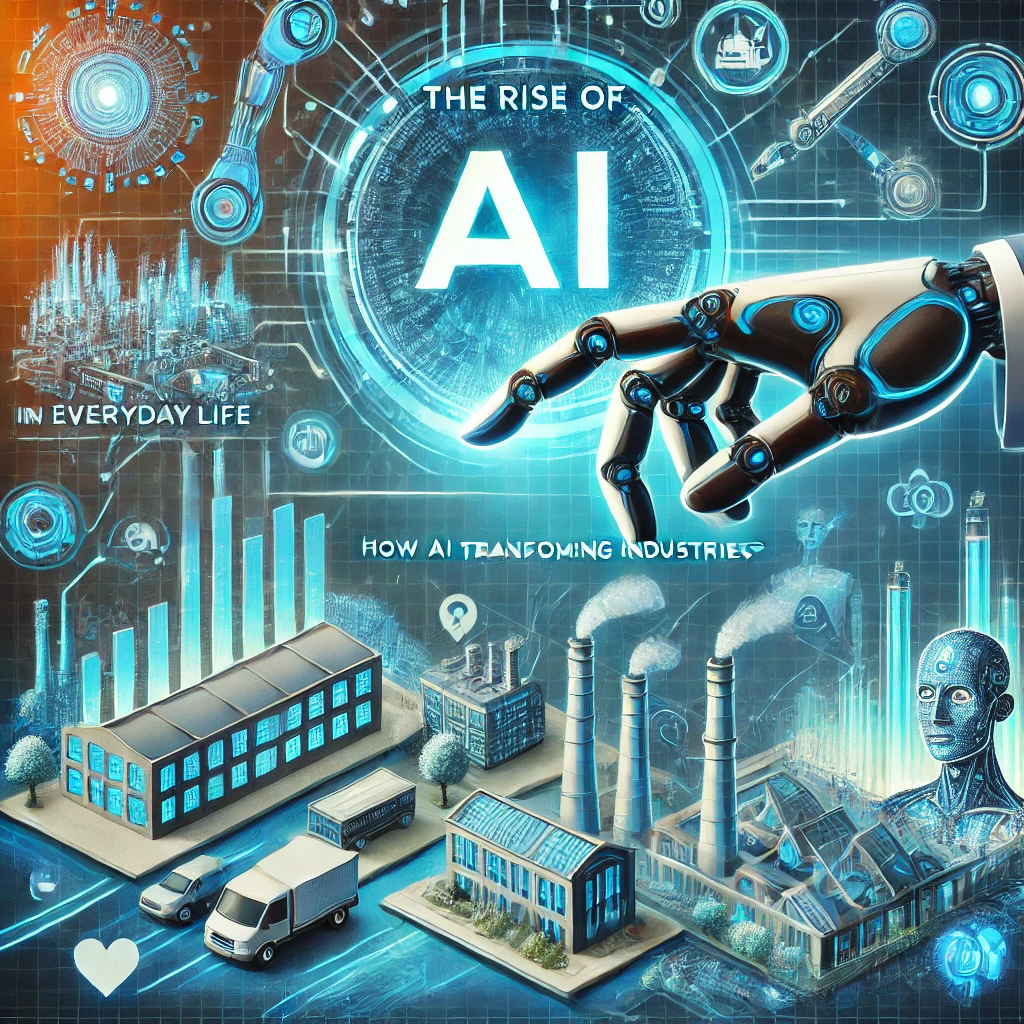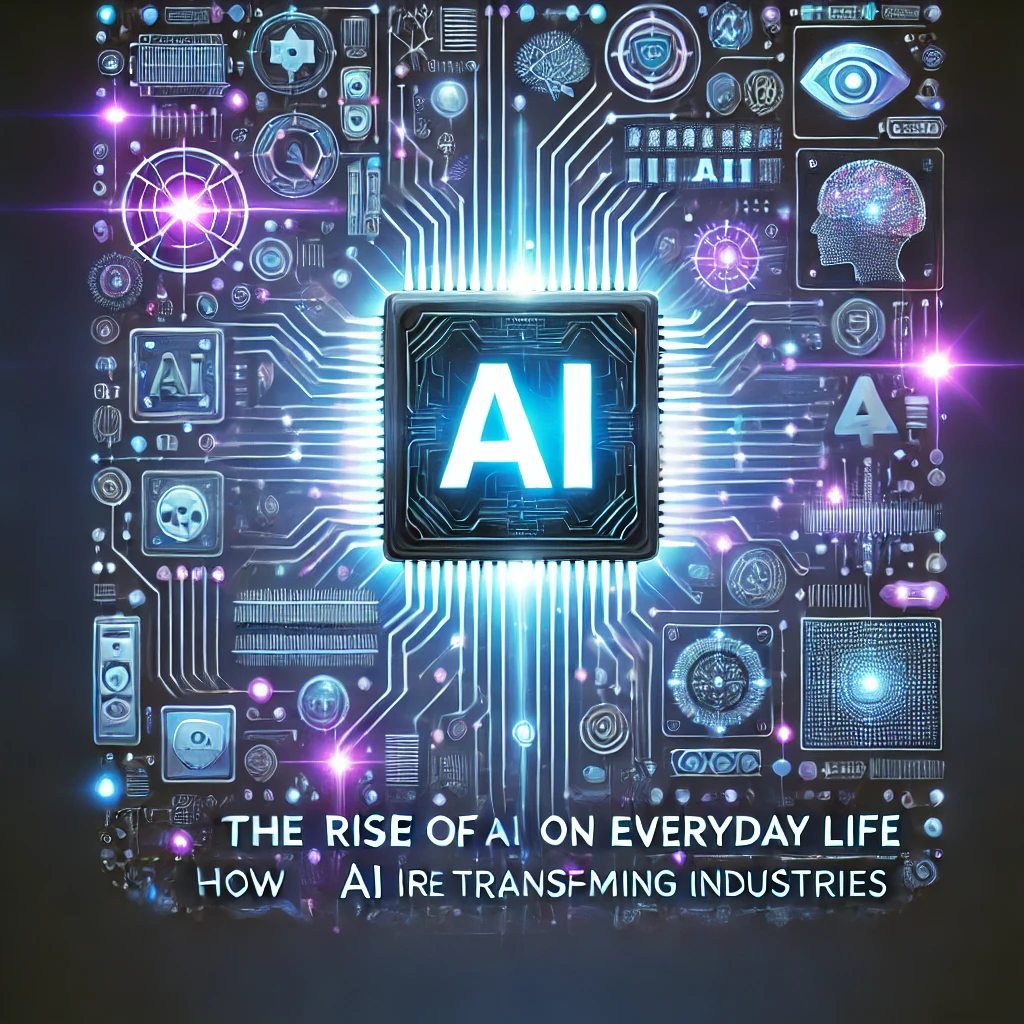The Rise of AI in Everyday Life: How AI is Transforming Industries
Artificial Intelligence (AI) is no longer a futuristic concept—it’s here, and it’s reshaping the world as we know it. From healthcare to entertainment, AI is revolutionizing industries and becoming an integral part of our daily lives. But what exactly is AI, and how is it transforming the way we live and work? In this blog, we’ll explore the rise of AI, its applications across various sectors, and what the future holds for this groundbreaking technology.
What is Artificial Intelligence (AI)?
Artificial Intelligence refers to the simulation of human intelligence in machines that are programmed to think, learn, and make decisions. AI systems can analyze vast amounts of data, recognize patterns, and perform tasks that typically require human intelligence, such as problem-solving, language understanding, and decision-making.
Types of AI:
- Narrow AI: Designed for specific tasks (e.g., voice assistants like Siri or Alexa).
- General AI: A theoretical form of AI that can perform any intellectual task a human can do.
- Superintelligent AI: An advanced form of AI that surpasses human intelligence (still in the realm of science fiction).
How AI is Transforming Industries
AI is not just a buzzword—it’s a powerful tool that’s driving innovation across industries. Here’s how AI is making an impact:
1. Healthcare
AI is revolutionizing healthcare by improving diagnostics, treatment, and patient care. For example:
- Medical Imaging: AI algorithms can analyze X-rays, MRIs, and CT scans to detect diseases like cancer with high accuracy.
- Drug Discovery: AI accelerates the process of identifying potential drug candidates, reducing the time and cost of development.
- Personalized Medicine: AI helps tailor treatments to individual patients based on their genetic makeup and medical history.
2. Finance
The finance industry is leveraging AI to enhance efficiency and security:
- Fraud Detection: AI systems can identify suspicious transactions in real time, preventing financial fraud.
- Algorithmic Trading: AI-powered algorithms analyze market trends and execute trades at lightning speed.
- Customer Service: Chatbots and virtual assistants provide 24/7 support to customers, answering queries and resolving issues.
3. Retail
AI is transforming the retail experience for both businesses and consumers:
- Personalized Recommendations: AI analyzes customer behavior to suggest products tailored to individual preferences.
- Inventory Management: AI predicts demand and optimizes stock levels, reducing waste and improving profitability.
- Cashierless Stores: AI-powered systems enable seamless checkout experiences, as seen in Amazon Go stores.
4. Manufacturing
AI is driving the fourth industrial revolution, or Industry 4.0, in manufacturing:
- Predictive Maintenance: AI predicts equipment failures before they occur, minimizing downtime and repair costs.
- Quality Control: AI-powered vision systems inspect products for defects with greater accuracy than human inspectors.
- Supply Chain Optimization: AI analyzes data to streamline logistics and improve efficiency.
5. Transportation
AI is paving the way for smarter and safer transportation systems:
- Autonomous Vehicles: Self-driving cars use AI to navigate roads, avoid obstacles, and make real-time decisions.
- Traffic Management: AI optimizes traffic flow by analyzing data from sensors and cameras.
- Ride-Sharing: AI algorithms match drivers with passengers and calculate the most efficient routes.
6. Entertainment
AI is changing how we consume and create entertainment:
- Content Recommendations: Streaming platforms like Netflix and Spotify use AI to suggest movies, shows, and music based on user preferences.
- Video Game Design: AI creates dynamic and immersive gaming experiences by adapting to player behavior.
- Content Creation: AI tools generate music, art, and even scripts, pushing the boundaries of creativity.
7. Education
AI is personalizing and enhancing the learning experience:
- Adaptive Learning: AI-powered platforms tailor educational content to individual students’ needs and learning styles.
- Automated Grading: AI systems grade assignments and exams, freeing up teachers’ time for more meaningful interactions.
- Virtual Tutors: AI-driven chatbots provide instant feedback and support to students.

AI in Everyday Life
AI is no longer confined to laboratories or tech companies—it’s woven into the fabric of our daily lives. Here are some examples:
- Voice Assistants: Siri, Alexa, and Google Assistant use AI to understand and respond to voice commands.
- Smart Home Devices: AI powers devices like thermostats, security cameras, and lighting systems, making homes more efficient and secure.
- Social Media: AI algorithms curate your newsfeed, recommend friends, and detect inappropriate content.
- Navigation Apps: Google Maps and Waze use AI to provide real-time traffic updates and route suggestions.
Challenges and Ethical Considerations
While AI offers immense benefits, it also raises important challenges and ethical questions:
- Bias and Fairness: AI systems can perpetuate biases present in the data they are trained on, leading to unfair outcomes.
- Job Displacement: Automation powered by AI could replace certain jobs, raising concerns about unemployment.
- Privacy Concerns: AI systems often rely on vast amounts of personal data, posing risks to privacy and security.
- Accountability: Determining who is responsible for AI-driven decisions, especially in critical areas like healthcare and law enforcement, is a complex issue.

The Future of AI
The future of AI is bright, with endless possibilities for innovation and growth. Key trends to watch include:
- AI and IoT Integration: Combining AI with the Internet of Things (IoT) will create smarter, more connected ecosystems.
- Explainable AI: Efforts are underway to make AI systems more transparent and understandable to users.
- AI in Space Exploration: AI will play a crucial role in analyzing data from space missions and exploring distant planets.
- AI for Social Good: AI is being used to address global challenges like climate change, poverty, and disease.
FAQs About AI
1. What is the difference between AI and machine learning?
AI is the broader concept of machines performing tasks that require human intelligence, while machine learning is a subset of AI that focuses on training algorithms to learn from data.
2. Can AI replace humans?
AI can automate certain tasks, but it is unlikely to fully replace humans, especially in roles that require creativity, empathy, and complex decision-making.
3. Is AI dangerous?
AI itself is not inherently dangerous, but its misuse or lack of regulation can lead to negative consequences. Ensuring ethical AI development is crucial.
4. How can businesses implement AI?
Businesses can start by identifying areas where AI can add value, such as customer service, data analysis, or process automation, and then invest in the necessary tools and expertise.
5. What skills are needed to work in AI?
Skills in programming, data science, mathematics, and domain knowledge are essential for working in AI.
6. How does AI impact privacy?
AI systems often rely on large datasets, which can include personal information. Ensuring data privacy and security is a key challenge in AI development.